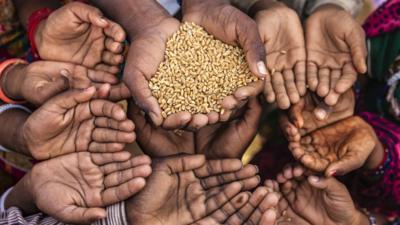On the third day of the holy month of Ramadan, I visited my hometown of Malumfashi in Katsina State. I was happy to witness the early days of the fast there which brought back nostalgic memories of my childhood. However, my reveries were abruptly cut short by the myriad of women I have seen come to my mother in search of food. There was something eerily chilling about the pain in their eyes and the subsequent joy in receiving 5kg bags of maize or rice and pasta which my mother has arranged in polythene bags, ready to go. The same afternoon, I went to pay homage to the district head of Malumfashi, the Galadima of Katsina and I learned of a similarly dire situation whereby, after providing for a few dozens of these women in the first two days of the month with grains and other food items, the royal came home from the mosque only to meet a queue of over 60 more women in his palace. Their number was increasing at a rate that no ordinary food bank or even programme can sustain.
This triggered a lot of curiosity in me because whereas this type of charity is prevalent among Muslims, particularly among royal fathers like Galadima and especially during the holy month of Ramadan when many people give away tons of food to the needy, there is a phenomenon beyond normal this year in the utter despair of such a huge fraction of our rural populations (particularly women) that I have never witnessed before. Speaking to some of the women, majority of whom turned out to be refugees of conflict-affected Kankara Local Government of Katsina State, gave me a terrifying insight about rural hunger which triggered this piece. There has been a looming food crisis in Katsina’s conflict-affected rural areas, which ironically happens to be the production bases of most of the food in the region. With the advent of the holy month, some of the people that have been affected by the raging insecurity which has resulted in abandoned farms and loss of lives and properties are desperate to find ways of not only surviving but also fulfilling their religious duties.
- Terrorism financing: Dozens arrested in nationwide crackdown
- 35 million Nigerians may abuse drugs by 2050 — Marwa
This rural hunger and Ramadan fast conundrum most adequately reflect hunger’s multi-dimensional nature which we often overlook. Nevertheless, ending hunger is the second Sustainable Development Goal (SDG) of the United Nations which has four country-specific targets to be achieved by 2030. The goal seeks to end undernourishment and malnutrition, the double agricultural productivity of small-scale producers and ensure sustainable and resilient agricultural practices. Studies have shown that for almost each of the targets of the SDG2, there have been improvements over the past decade (perhaps with the exception of the sustainability target) but not enough to make the 2030 deadline. If we localise further, In Nigeria, and Katsina for instance, because of these multiple dimensions of hunger, we may be missing the 2030 mark by a very wide margin indeed.
If we are to end hunger in our rural areas, we need evidence-based frameworks for targeting transformational change in our regions’ local food and agricultural systems as well as the overall social fabric. While this is hinged on agricultural and food productivity, it goes beyond it. However, on the food part, we must focus on the demand for food as well as its supply; its quality as well as quantity. The Food and Agriculture Organization (FAO) calculates that about half the world’s hungry people are smallholder farmer families and 20 per cent are landless families dependent on farming. This finding is no more factual than it is in rural Katsina State, like Kankara Local Government. As such, our ending rural hunger and achieving food security requires a particular focus on the needs of these small-scale farms and farmers, including the special challenges faced by the women. Over 90 per cent of our farms in the whole country are by every definition smallholder in nature. Much of the march to end hunger will be determined by what happens on these farms. These farms must be secure, efficient and productive if we are to avoid the debilitating ripple effect of food insecurity to our societal fabric.
I do not mean to imply that all our rural areas in Nigeria or the world are the same or that they face the same issues. I believe we must examine available data to identify the nature of local needs and priorities for every rural area. There are places where more focus should be on agricultural productivity and others where it should be on nutrition or access to food. Also, we must identify policy constraints that impede advancement in these areas and they are in no shortage in Nigeria for instance. It is also inarguable that better policies are an important determinant of food and nutrition security, even after accounting for region and income levels.
Lastly, and perhaps most importantly, we must intensify investments that are lacking and greatly needed, either directly into agricultural support systems such as investments in agricultural science and extension services; or indirectly toward the inputs that support agricultural markets such as roads, rural electrification, seeds, soil nutrients, and access to rural finance. In such cases where there is an apparent disruption of business as usual, as we have seen because of the COVID-19 pandemic and the banditry and kidnapping scourge in some of our rural areas in Katsina, investments must also connote of support to households through rural safety nets.
In my opinion, these are all public investments that must be undertaken by the government which is the most capable vehicle for systemic development. No amount of charity or philanthropy can sustainably deal with this problem. This is why the Galadima or any royal for that matter, and the pious Muslim charity giver no matter how big his piety, cannot cope with the influx of hungry women and men that will pour if we do not end rural hunger through sound public investments to ensure food and nutrition security.

 Join Daily Trust WhatsApp Community For Quick Access To News and Happenings Around You.
Join Daily Trust WhatsApp Community For Quick Access To News and Happenings Around You.
